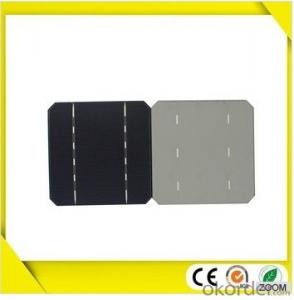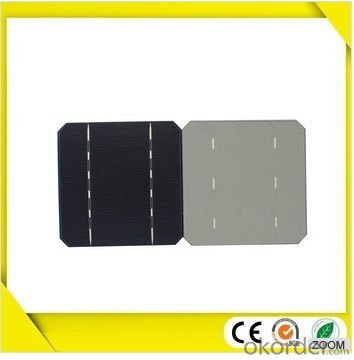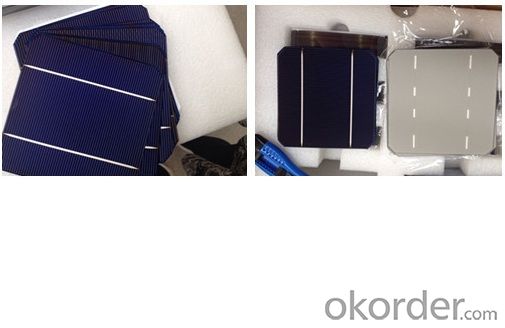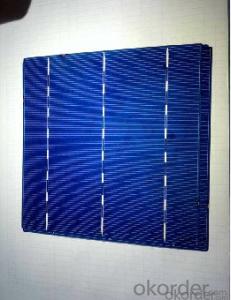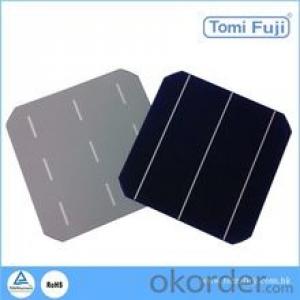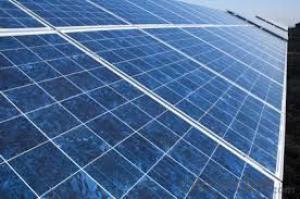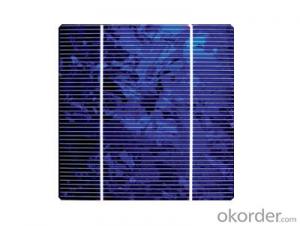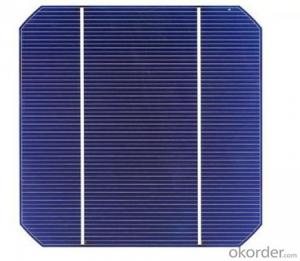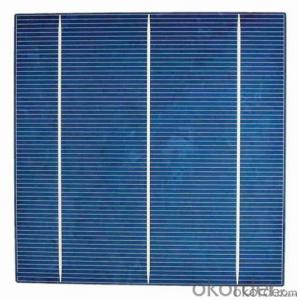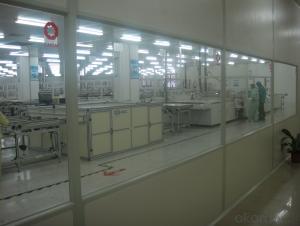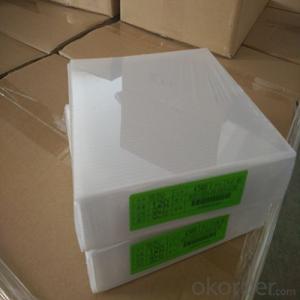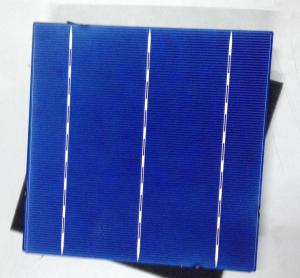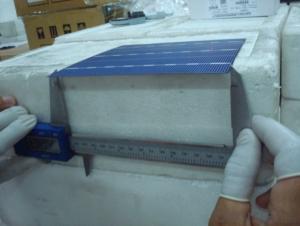Mesoscopic Solar Cells - 5 Inch A Grade 2BB Cheap Solar Cell
- Loading Port:
- Shanghai
- Payment Terms:
- TT or LC
- Min Order Qty:
- 500 watt
- Supply Capability:
- 100000 watt/month
OKorder Service Pledge
OKorder Financial Service
You Might Also Like
Our Advantage
1. High efficiency and High power.
2. Long-term electrical stability.
3. Lowest price and Fastest delivery.
4. Good quality and good service.
5.Bulk supply
6. Good Warranty
7.Big Sale
8.Made in Taiwan/Germany etc for high quality
9.More than 35 years on the lifetime.
10 DHL/Fedex/UPS/TNT/EMS etc
| Material: | Monocrystalline Silicon | Size: | 125x125 | Max. Power: | 2.86w |
| Size: | 125X125mm | Material: | monocrystalline Silicon | Color: | Dark Blue |
| Max. Power: | 2.86 watts | efficiency: | 18.40% | busbar: | 2 |
| Voltage: | 0.508V-0.53V | Thickness: | 190um±20um |
| Packaging & Delivery | |
| Packaging Detail: | 100pcs in one box,1000pcs per carton, standard export carton Cheap Solar cell |
| Delivery Detail: | 3 days after received the payment. |
| Specifications |
| Cheap Solar cell |
| 1. mono solar cell |
| 2. 2.86w |
| 3.A grade |
Solar Cell 5 Inch A Grade 2BB Cheap , Cell Solar
Product Description
1. High efficiency and High power
2. Long-term electrical stability
3. Low price and Fast delivery
4. 25 years life
Solar cell Electrical Parameters
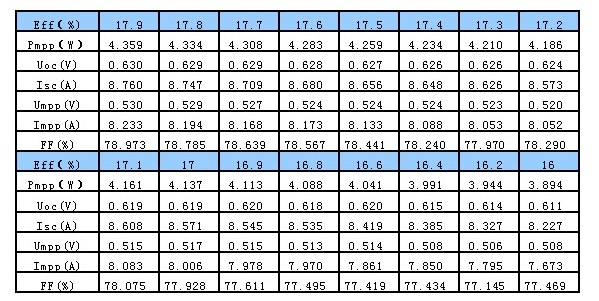
Solar cell I-V Curve
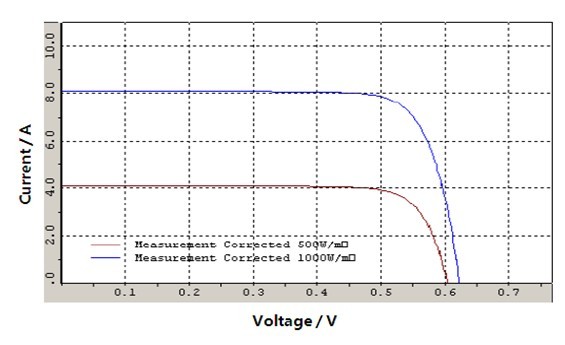
Solar cell Spectral Response
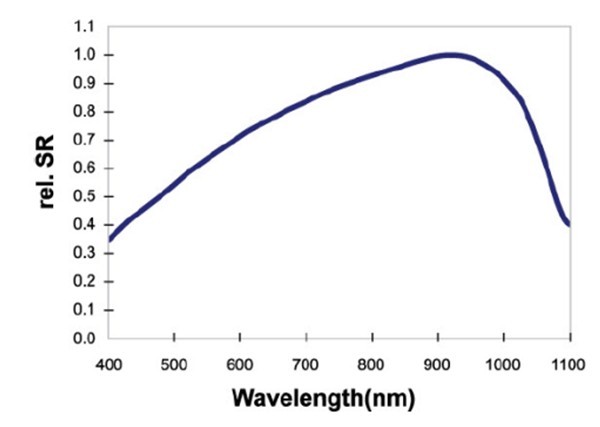
| Solar cell Temperature Characteristics | ||
| Name | Unit | Value |
| Current (Isc) | [%/°C] | 0.03 |
| Voltage(Voc) | [%/°C] | -0.35 |
| Power( Pmax ) | [%/°C] | -0.41 |
| Intensity Dependence | ||
| Irradiance ( W/m² ) | Voc/mV | Isc/mA |
| 1000 | 1 | 1 |
| 800 | 0.996 | 0.799 |
| 500 | 0.964 | 0.541 |
| 300 | 0.941 | 0.293 |
| 200 | 0.921 | 0.191 |
- Q: What is the difference between polysilicon and monocrystalline silicon photovoltaic cells?
- In the photovoltaic technology and micro-semiconductor inverter technology today, the rapid development of the use of silicon single crystal produced by solar cells can be directly into solar energy into light, to achieve the beginning of the green energy revolution.
- Q: How do solar cells perform in areas with high levels of humidity?
- Solar cells can still perform efficiently in areas with high levels of humidity. However, excessive moisture in the air can cause a slight decrease in their overall performance due to increased resistive losses. It can also lead to the formation of water droplets on the surface of the solar panels, which can temporarily block sunlight and reduce energy production. To mitigate these effects, solar panels are typically designed to be water-resistant and have anti-reflective coatings to prevent water droplet formation. Overall, while humidity can have a minor impact on solar cell efficiency, it does not significantly hinder their ability to generate electricity.
- Q: Can solar cells be used to power remote monitoring systems?
- Yes, solar cells can be used to power remote monitoring systems. Solar panels can convert sunlight into electricity, which can then be used to power various devices, including remote monitoring systems. This makes solar cells a reliable and sustainable option for powering such systems in remote locations where access to traditional power sources may be limited or unavailable.
- Q: Are solar cells durable?
- Yes, solar cells are generally durable. They are designed to withstand various weather conditions, including rain, snow, and extreme temperatures. Additionally, most solar cells come with warranties that guarantee their performance for several decades.
- Q: Can solar cells be used for powering communication systems?
- Yes, solar cells can be used to power communication systems. Solar cells convert sunlight into electrical energy, which can then be used to power various electronic devices, including communication systems. This renewable source of energy is a sustainable and environmentally friendly option for powering communication systems, especially in remote or off-grid locations where access to traditional power sources may be limited.
- Q: How do solar cells handle fluctuating sunlight intensity?
- Solar cells are designed to handle fluctuating sunlight intensity by having built-in mechanisms that regulate the amount of energy they produce. These mechanisms include maximum power point tracking (MPPT) algorithms, which continuously monitor the incoming sunlight and adjust the voltage and current output of the solar cells to maximize their efficiency. Additionally, solar cells are also equipped with bypass diodes that help in bypassing shaded or underperforming cells, ensuring that the overall system performance is not significantly affected by fluctuating sunlight intensity.
- Q: How do solar cells perform in areas with high levels of snowfall?
- Solar cells generally do not perform optimally in areas with high levels of snowfall. The accumulation of snow on the surface of solar panels can significantly reduce their efficiency by blocking sunlight and preventing the cells from generating electricity. Regular snow removal or tilting the panels at an angle can help mitigate this issue, but it may still impact their overall performance in such regions.
- Q: Is the solar cells factory in China good and trustworthy?
- I can only say 50% of the solar cell factories in China are good, and they can meet your quality standard, while the other 50% of the solar cell factories are not very reliable.
- Q: What is the role of charge controllers in solar cell systems?
- The role of charge controllers in solar cell systems is to regulate and optimize the charging process of the batteries connected to the solar panels. They monitor the voltage and current levels from the panels and ensure that the batteries are charged efficiently and safely. Charge controllers also protect the batteries from overcharging, over-discharging, and other potential damage, ultimately extending their lifespan.
- Q: Can solar cells be used in weather monitoring systems?
- Yes, solar cells can be used in weather monitoring systems. Solar cells can generate electricity from sunlight, which can be used to power various components of weather monitoring systems such as sensors, data loggers, and communication devices. This allows for remote and autonomous operation of these systems, making solar cells an ideal and sustainable power source for weather monitoring applications.
Send your message to us
Mesoscopic Solar Cells - 5 Inch A Grade 2BB Cheap Solar Cell
- Loading Port:
- Shanghai
- Payment Terms:
- TT or LC
- Min Order Qty:
- 500 watt
- Supply Capability:
- 100000 watt/month
OKorder Service Pledge
OKorder Financial Service
Similar products
Hot products
Hot Searches
Related keywords
